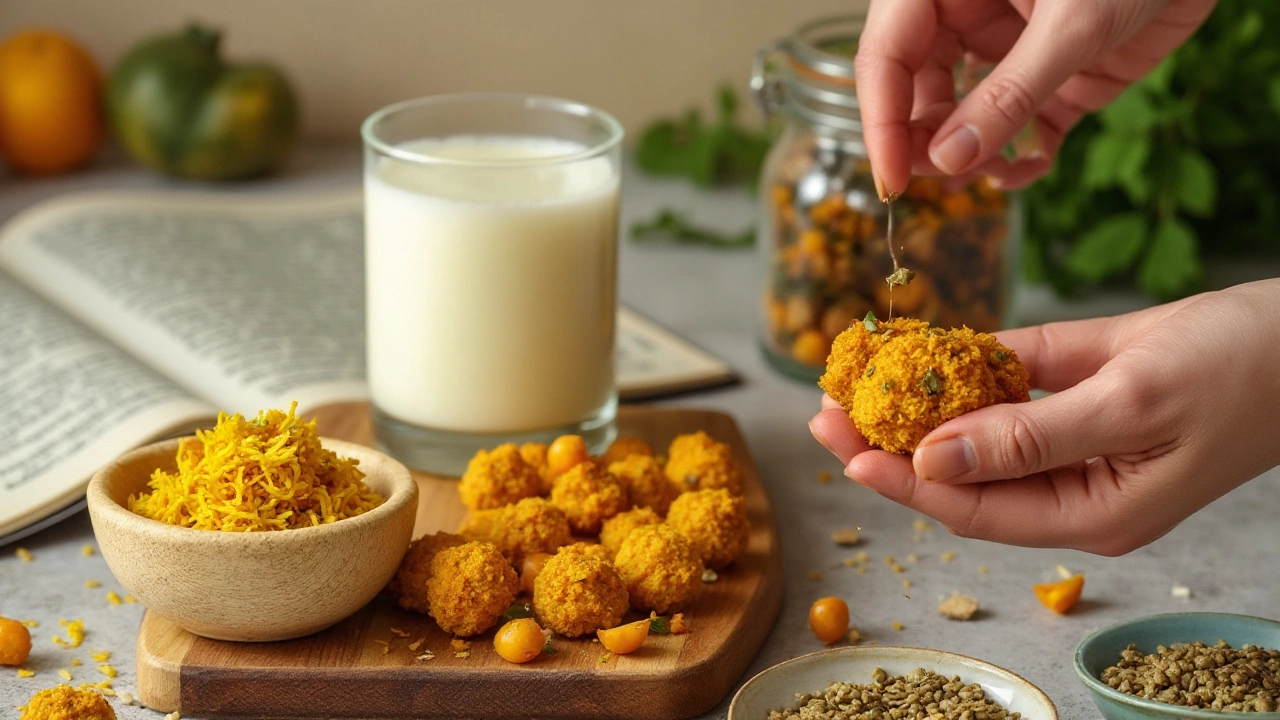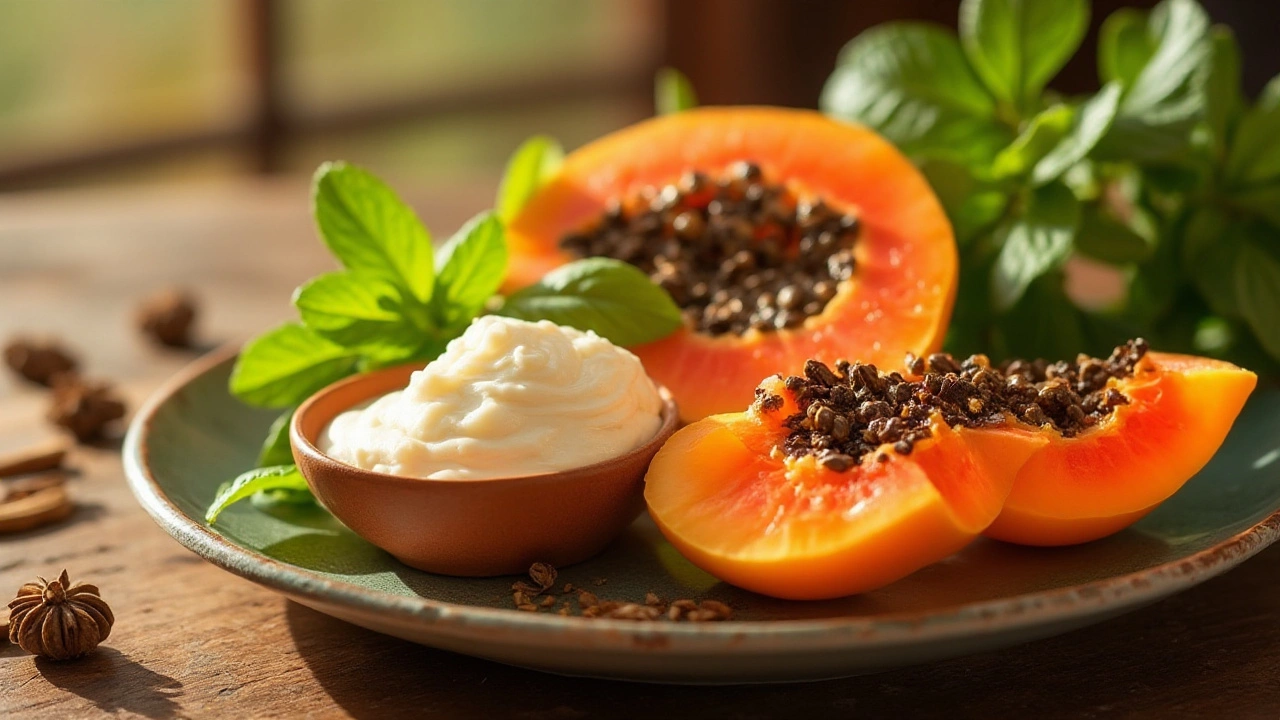The journey to discovering the perfect snack is both a culinary and scientific adventure, especially when it comes to balancing stomach acidity. For many, acidity can be a pesky intruder, disrupting daily life. Yet, interestingly, traditional Indian diets hold the secrets to managing this discomfort naturally.
Imagine indulging in delicious snacks that not only satisfy your taste buds but also work silently to ease your tummy troubles. These aren't mere meals; they're age-old remedies hiding in plain sight. Uncover how choosing the right munchables can flip the script on stomach acid woes, and breathe peace back into your gut.
- Understanding Stomach Acid and Its Causes
- Healing Properties of Indian Ingredients
- Specific Snacks to Try
- Homemade vs. Store-bought Options
- Lifestyle Tips for Managing Acidity
Understanding Stomach Acid and Its Causes
Stomach acid, scientifically known as gastric acid, plays a crucial role in digestion. It's primarily composed of hydrochloric acid, potassium chloride, and sodium chloride, all of which contribute to the breakdown of food particles in our stomach. This acidic environment also helps in killing potential pathogens that sneak in with the food we consume. However, the issue arises when this acid is produced in excess, seeping back into the esophagus—a condition commonly known as acid reflux. Stress, obesity, and certain food habits can act as triggers, causing an imbalance that leads to this uncomfortable occurrence.
Interestingly, the delicate lining of the stomach is specifically adapted to withstand this acidity. However, the esophagus lacks such protection, making it vulnerable to damage from frequent exposure to acid. Consuming too much spicy food, caffeinated drinks, or even dealing with chronic stress are some known culprits that exacerbate the production of stomach acid. A study published in the National Center for Biotechnology Information revealed that there's a notable correlation between lifestyle choices and the prevalence of gastric acidity. This means what we eat and how we live directly influences our digestive health.
"The rise of acid-related disorders emphasizes the need for effective dietary management." – Dr. Mangala Narang, Gastroenterologist
It's not all doom and gloom, though. Understanding these causes allows us to take control of our diet and make better choices, especially when it comes to selecting foods that absorb stomach acid. Besides, incorporating a balance of acid-neutralizing ingredients can significantly reduce the symptoms and frequency of acid reflux episodes. Embracing a diet rich in fruits and vegetables, while avoiding trigger foods, is often recommended. By recognizing the root of the problem, one can tailor their snacking habits to not only enjoy taste but also support healthier digestion.
Healing Properties of Indian Ingredients
When it comes to traditional Indian cuisine, it’s no accident that these vibrant dishes often double as holistic remedies. The magic lies in the ingredients—powerful allies in nurturing the body's natural balance, especially concerning stomach acid management. Several spices and herbs commonly found in Indian kitchens, such as cumin, fennel, and cinnamon, are renowned for their digestive promise. They do not merely add flavor but actively contribute by reducing bloating and helping to neutralize excessive acid production.
The refreshing herb mint, often celebrated in teas and chutneys, is a marvel in its own right. Known for its cooling effect, mint soothes the stomach lining, thereby mitigating irritation and acid formation. Similarly, ginger, with its fiery tang, is acknowledged for easing nausea and promoting healthy digestion by enhancing gastric emptying. Combined, these elements create an anti-inflammatory powerhouse that not merely responds to symptoms but also cultivates a resilient gut.
Among these respected ingredients is the ever-popular carom seed (ajwain), often used in savory snacks across India. Ajwain contains thymol, a compound noted for its role in stimulating digestive enzymes which facilitate the breakdown of foods, thereby minimizing acid buildup. Turmeric, with its vibrant golden hue, is another force to be reckoned with. Its active compound, curcumin, not only delights taste receptors but also provides impressive anti-inflammatory properties beneficial for maintaining gut health. As noted in Ayurvedic practices, turmeric acts as an all-around facilitator of wellness, aiding in digestion and preventing acid reflux.
Let's shift momentarily to the mildly sweet and hydrating treat, coconut. In many Southern Indian dishes, coconut balm is an ingredient utilized not just for its flavor, but also for its capability to act as a natural antacid. By fostering the mucous membranes of the stomach, it encourages adequate protection against hydrochloric acid. This protective attribute is paralleled by dates—famous for their fibrous texture—and their ability to consistently regulate bowel movements and enhance overall digestive capability.
"The nuanced synergy of spices creates a tapestry of flavor while subtly balancing the body's inner harmony," observed Deepak Chopra, a well-known advocate of integrative medicine.
In understanding these healing potentials, it becomes clear why opting for healthy snacks steeped in traditional wisdom is a savvy move for those grappling with digestive dilemmas. Not only do these magical marvels quiet the occasional fiery pangs of stomach acid, but they also offer a compelling invitation into the inviting world of balanced gastronomy.

Specific Snacks to Try
Delving into the heart of Indian cuisine, several delectable snacks stand out for their potential to alleviate the discomfort of excess stomach acid. These snacks are not merely satiating but also packed with health-promoting properties. One classic example is the humble Khichdi, a soothing blend of rice and lentils known across Indian households for its simplicity and digestive ease. Often prepared with a pinch of turmeric and cumin seeds, Khichdi can act as a gentle balm for an upset stomach, aiding in digestion with its mild and comforting texture.
Another delightful choice is roasted chana or chickpeas. Rich in fiber and low in fat, this snack is not only nutritious but also incredibly satisfying. The high fiber content supports digestion, and when roasted with a sprinkle of salt and cumin, it transforms into a tasty treat that remains light on the stomach. Finding a balance between health and taste has never been easier, especially with roasted chana as your go-to snack.
"A balanced diet is a cookie in each hand," they say, but perhaps it's a roasted chana in this context.
Turning to nuts, almonds deserve a special mention. They are alkaline in nature, which helps neutralize stomach acid while simultaneously offering a delightful crunch. Enjoying a small handful of almonds can help maintain satiety while counteracting acidity, making them an ideal snack for those pesky hunger pangs that also threaten to disrupt harmony in your belly.
Equally noteworthy is yogurt with banana—a marriage of probiotics and natural sweetness that works wonders. Yogurt brings the goodness of healthy bacteria, enhancing gut flora and moderating acidity, while bananas, being low in acid, offer soothing relief. Pairing these can result in a refreshing and satiating snack that not only comforts but also nourishes from within.
Last but not least, there's the versatile puffed rice, popularly known as murmura. With its airy texture and potential for flavor, it can be spiced subtly with peanuts or a dash of mint chutney, evolving into a light snack that is both crunchy and easy on the digestion. Its low acidity makes it a perfect alternative for those seeking something savory yet stomach-friendly.
Homemade vs. Store-bought Options
When it comes to the realm of Indian snacks designed to address stomach acid issues, the debate between homemade and store-bought options takes center stage. It's tempting to grab something pre-packaged off the shelf, especially when convenience plays a crucial role in our busy lives. However, homemade snacks offer a wealth of benefits that extend beyond mere nutritional value. First and foremost, you gain complete control over the ingredients that go into your dishes. There's an unparalleled satisfaction in knowing each spice, grain, and herb you add has a purpose, whether it’s to soothe your acidity or boost overall gut health.
Store-bought snacks often come with the hidden baggage of preservatives and additives, which can sometimes exacerbate stomach issues. This can be quite a concern depending on your digestive sensitivities. Moreover, these packaged options can trick you with catchy labels mentioning health benefits that may not be entirely accurate, whereas when you cook at home, authenticity and quality aren't compromised. According to a study published in the "Journal of Nutrition and Food Sciences," individuals who predominantly consumed homemade foods experienced fewer digestive issues, highlighting the positive impact of personal culinary efforts.
Venturing into homemade preparations may seem daunting, but once you find your rhythm, it becomes a delightful routine. Engage with options like roasted chickpeas seasoned with turmeric and cumin—an anti-inflammatory combination. Or perhaps, opt for flattened rice snacks seasoned with cumin and coriander; these not only help with acid relief but also serve as a delightful snack. When stored properly, these homemade items retain freshness and are just as good, if not better, than those sitting on store shelves.
If you're leaning toward store-bought choices due to time constraints, there are ways to navigate wisely. Look for products with minimal ingredients, focusing on those with known soothe properties such as amla or ginger, often listed in small doses. When perusing aisles, checking for sugar content and sodium levels is crucial, as these can easily sneak into your diet and counteract attempts to reduce acidity. Holistic health coach Sarah Napthali says,
"The simplicity of homemade snacks can be surprisingly fulfilling both in terms of health and taste, as they often reflect a deeper connection with the food we consume."
For those exploring baked goods, it's worthwhile considering the traditional bajra or millet biscuits, usually available in health food sections. Despite being store-bought, these can offer a gluten-free alternative supporting digestion. Opt for brands that value authentic preparation methods and focus on whole, clean ingredients. In the journey towards balancing stomach acidity, the choice between homemade and store-bought snacks isn't as rigid as it appears. By blending both approaches smartly, you can maintain convenience without compromising on your digestive health.

Lifestyle Tips for Managing Acidity
Dealing with stomach acidity can sometimes feel like an uphill battle, especially when the symptoms start interfering with the simple joys of daily life. However, integrating some practical lifestyle tips can make a significant difference. For starters, leading an active lifestyle can contribute immensely to digestive health. Regular exercise, like yoga, brisk walking, or swimming, not only promotes overall well-being but also aids in the toning of the abdominal muscles, indirectly reducing the pressure on the stomach and minimizing acid reflux. Interestingly, a study published in the Journal of Gastroenterology highlighted the benefits of physical activity in reducing acidity episodes, which should encourage you to lace up those sneakers more often.
Mindful eating is another pivotal change that can keep the pesky acidity at bay. Taking time to properly chew food can help in the initial breakdown, making it easier on your digestive system. Balanced, smaller meals spread throughout the day can help avoid overstuffing the stomach, which often triggers acid production. Dinner time is especially critical; finishing your meal at least three hours before bedtime allows your body to digest most of the food before lying down. This aligns with the traditional wisdom that our grandmothers have been incorporating into their lifestyles for ages, often echoing that 'an early meal is a healthy meal.'
Stay Hydrated, Stay Healthy
Hydration plays a crucial role in maintaining optimal digestive health. While many might believe in gulping down water at any opportunity, the trick lies in sipping water at regular intervals throughout the day. Lemon-infused lukewarm water or coconut water are excellent options that can neutralize excess stomach acid. These natural alternatives not only replenish the body's water content but also combat acidity with their alkaline properties. According to nutritionist Rujuta Diwekar, "Keeping the gut hydrated with the right kind of fluids is as important as any other dietary habit."
Smart Eating Choices
Avoiding certain trigger foods can be of paramount importance. Spicy dishes, caffeinated drinks, and excessive oily items tend to increase acidity levels. Instead, slide in options like oatmeal, bananas, and cucumbers that are known to soothe the digestive tract. Consuming fermented foods like yogurt or buttermilk can introduce beneficial probiotics to your system, greatly improving gut health and reducing acid formation. Including such smart snacks regularly keeps your tummy happy and healthy!
These snippets of wisdom might sound simple, but when combined with conscious food choices and a proactive approach, they form a strong defense against stomach acidity. Embracing these tips can allow anyone to reclaim control over their digestive comfort, paving the way to a more vibrant and balanced life.
